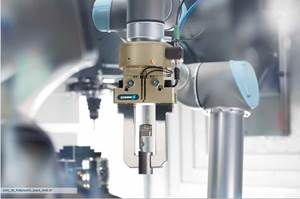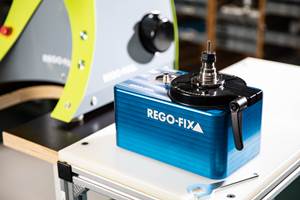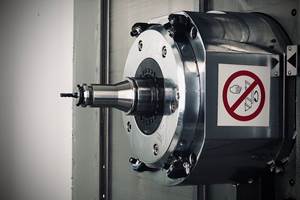Share






A new tool offers a fundamentally different method for forming internal threads in aluminum and other lightweight alloys. Emuge Corp. developed the Punch Tap in conjunction with Audi, which held exclusive rights to its use in the automotive industry until its wide-market debut at the International Manufacturing Technology Show () 2018. While other threading techniques slowly enter and exit the hole to avoid damaging the threads, the Punch Tap is designed for quickly plunging into the material to thread depth, cold-forming the threads with a single twist and exiting—all in a fraction of the time it takes to using a traditional tap, cold-forming tap or a thread mill. Thanks to its atypical geometry, it can move quickly without damaging the threads it forms.
The tool has two helical rows of flutes with thread-forming teeth, offset 180 degrees from each other, traveling down the length of the tool. Two pilot edges, one at the tip of each flute, create two helical clearance grooves for the flutes to follow. These grooves ensure the thread-forming teeth do not touch the interior wall as the tool rotates clockwise into the hole. Once the tool reaches full depth, it stops, then rotates 180 degrees counterclockwise. Only then do the teeth contact the hole wall to cold-form all of the threads. After the 180-degree rotation, the rows of flutes are aligned with the clearance grooves opposite of those they followed plunging into the hole. The tool continues a counterclockwise rotation as it exits the hole to keep the flutes inside the helical clearance grooves. After the Punch Tap exits the hole, the clearance grooves remain, but are said to have a negligible effect on thread function. (The process is demonstrated in .)
The company says this tool can improve hole-threading speed by 75 percent compared to conventional and cold-forming taps, which require precise rotation to prevent damage to the newly created threads as the tool exits the hole. In demonstrations at this year’s IMTS, the Punch Tap took less than half a second to completely thread and exit a hole in an aluminum workpiece. This speed can translate into substantial time savings for any manufacturer needing to thread large numbers of holes in lightweight metal parts.
Unlike many tools, the Punch Tap is only available as a customized product. “It is an engineered product that has design features which are application-specific to an end-user’s component design and material composition,” says Emuge Product Director Mark Hatch. He says the company will work with customers to perform detailed analysis and adjustments, depending on a broad range of technical issues.
The Punch Tap requires a specialized toolholder called the PT Synchro. This holder provides force-locked rigid clamping via a cylindrical ER collet that enables high torque and reduces the stress on the tool. The standard surface treatment is a TIN-T26 coating, and it forms threads in sizes ranging from #8 through 5/16.
The tool is unsuitable for metals much stronger than aluminum, both because it creates threads via cold forming and because the cutting edges that produce the entry grooves can take only a limited amount of shearing force. Additionally, the plunging motion of the tool path requires a the manufacturer use a CNC machine with a control capable of performing the specialized Punch Tap cycle, currently available in the latest generations of Heidenhain, Siemens and FANUC controls.
Related Content
Shop Reclaims 10,000 Square Feet with Inventory Management System
Intech Athens’ inventory management system, which includes vertical lift modules from Kardex Remstar and tool management software from ZOLLER, has saved the company time, space and money.
Read MoreLean Approach to Automated Machine Tending Delivers Quicker Paths to Success
Almost any shop can automate at least some of its production, even in low-volume, high-mix applications. The key to getting started is finding the simplest solutions that fit your requirements. It helps to work with an automation partner that understands your needs.
Read MoreFive Common Mistakes Shops Make with ER Collets (And How to Prevent Them)
Collets play a crucial role in the machining process, so proper tool assembly and maintenance is important. Here are five potential pitfalls to avoid when using ER collets.
Read MoreHow to Troubleshoot Issues With Tool Life
Diagnosing when a tool is failing is important because it sets an expectation and a benchmark for improvements. Finding out why gives us a clue for how to fix it.
Read MoreRead Next
Machine Shop MBA
Making Chips and 91ÊÓƵÍøÕ¾ÎÛ are teaming up for a new podcast series called Machine Shop MBA—designed to help manufacturers measure their success against the industry’s best. Through the lens of the Top Shops benchmarking program, the series explores the KPIs that set high-performing shops apart, from machine utilization and first-pass yield to employee engagement and revenue per employee.
Read MoreLast Chance! 2025 Top Shops Benchmarking Survey Still Open Through April 30
Don’t miss out! 91ÊÓƵÍøÕ¾ÎÛ's Top Shops Benchmarking Survey is still open — but not for long. This is your last chance to a receive free, customized benchmarking report that includes actionable feedback across several shopfloor and business metrics.
Read MoreAMRs Are Moving Into Manufacturing: Considerations for Implementation
AMRs can provide a flexible, easy-to-use automation platform so long as manufacturers choose a suitable task and prepare their facilities.
Read More






















